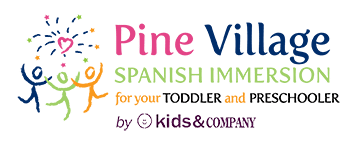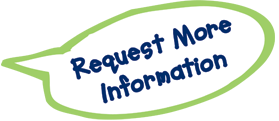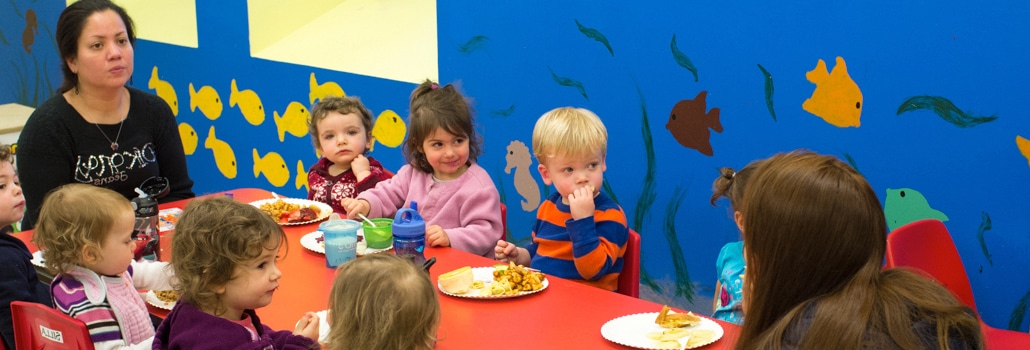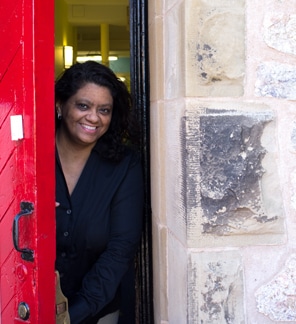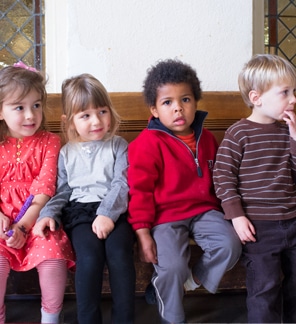Here are some of the questions that are frequently asked by parents who are interested in Pine Village.
If your question isn’t answered below, or if you’d like to speak with someone further, please contact Christine Williams, Associate Director of Enrollment & Communications, at enrollmentpvp@gmail.com — she would be happy to talk to you!
- What does immersion really mean?
- Is your school for Spanish speaking children?
- How do you teach Spanish to the children?
- How will my child learn English?
- What if my child feels lost or doesn’t understand?
- My child already speaks another language, won’t they get confused trying to learn a third?
- Do all the teachers speak Spanish?
- What if we don’t speak Spanish at home?
- How large are class sizes?
- Do children attend the preschool during the summer as well?
- Do you provide food?
- What is your sick policy?
- What kinds of things do you do with the kids all day?
Q. What does immersion really mean?
A. Immersion means that the children are completely immersed in the second language (Spanish) for the majority of their day. It is a natural, flowing part of their environment and, before long, it is completely natural. When Pine Village began in 2001, we were at a 50/50 model, where 50% of the day was in Spanish and 50% was in English. Over time, we moved to an 80/20 model, and now are at 100% immersion.
Top
Q. Is your school for Spanish speaking children?
A. Our school is for all children! Most of our families, about 70%, are English speakers. They want their children to be exposed to a second language in the most natural and comfortable way, and that’s why they come to Pine Village. We also have families that have one or two native Spanish speakers. They want to keep their heritage language alive and have their children raised bilingual.
Top
Q. How do you teach Spanish to the children?
A. We don’t “teach” Spanish to the children. Language is not the content of instruction, but the vehicle for it. We have an emergent curriculum, with themes and topics like any other school, but we speak Spanish. Spanish is everything we do! Our books are in Spanish, we do circle time in Spanish, we sing in Spanish.
Top
Q. How will my child learn English?
A. This is a very common question we get asked. There’s often the fear that children won’t get the English skills they need. That’s not the case. They get English from their peers, in their environment, from the media, at home, and in every other aspect of their lives. They are constantly exposed to it, and living in an English-speaking environment is enough for the children to be bilingual in both languages.
Top
Q. What if my child feels lost or doesn’t understand?
A. We would NEVER let children feel lost because of a language barrier! Our first and foremost concern is the child. We want them to love their first experience of school, and we would never let them miss out on any experience at any moment because of a language issue. Our teachers will absolutely use English in the moment they notice the child needs it.
Top
Q. My child already speaks another language, won’t they get confused trying to learn a third?
A. Children don’t have the hesitations or fears about language like adults do! To them, it is fun, a game, and it just is. They absorb language incredibly quickly and that’s true for one, two, or three languages at a time. Especially during the early years when language is so easily absorbed.
Top
Q. Do all the teachers speak Spanish?
A. All of our teachers are fully fluent in both languages. Because we want the language that is spoken at our schools to be effortless and fluid, we seek native speaking teachers or teachers who learned the language abroad in a Spanish-speaking country. This makes the immersion experience real and organic.
Top
Q. What if we don’t speak Spanish at home?
A. There are many ways to support your budding bilingual! You don’t need to speak Spanish to be able to support them. They will gladly tell you and teach you what they learn. We also offer many opportunities in parent communication so that you feel like you are part of their everyday lives. At Pine Village, we want our parents to be involved in any way they can, and our teachers and directors make sure that parents are getting all the information and opportunities they need to be part of our community.
Top
Q. How large are class sizes?
A. Class sizes depend on the age of the children. Generally for our toddler groups the ratio is 2 teachers to 9 children and in preschool the ratios are 1 teacher with 9 children, or 2 teachers with 18 children.
Top
Q. Do children attend the preschool during the summer as well?
A. Our school year runs from September through June, and then we offer two four-week summer sessions that run in July and August. The Summer Program is optional, but encouraged.
Top
Q. Do you provide food?
A. Although we don’t provide meals, we have a special tradition at Pine Village for morning snack. We enjoy “friendship fruit” each morning, where each child brings in a piece of fruit to share with the class. The fruit is then cut and shared with everyone. We see this as an opportunity to practice both healthy eating, as well as using it as an opportunity to learn about sharing.
Top
Q. What is your sick policy?
A. If your child arrives at school with symptoms of illness or disease he or she will be sent home. We rely heavily on all parents to exercise good judgment in this matter. Should a child become ill at school, a parent or back-up person will be notified and the child will be isolated from the other children. He or she will be made comfortable with quiet activities and under the supervision of a staff member at all times, until he or she is picked up.
Top
Q. What kinds of things do you do with the kids all day?
A. At Pine Village we follow a Piaget-based model of emergent curriculum. We provide structure for learning through play and meaningful experiences and activities. Teachers take the lead from the children and become aware of the children’s individual needs, strengths, and customize the curriculum based on the observation of the children’s interests. They then create learning opportunities that appeal to all the senses and tap on all areas of development and curriculum.
Top
